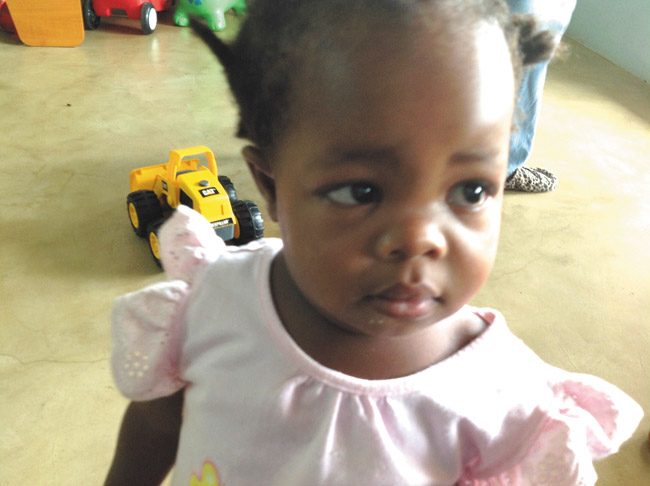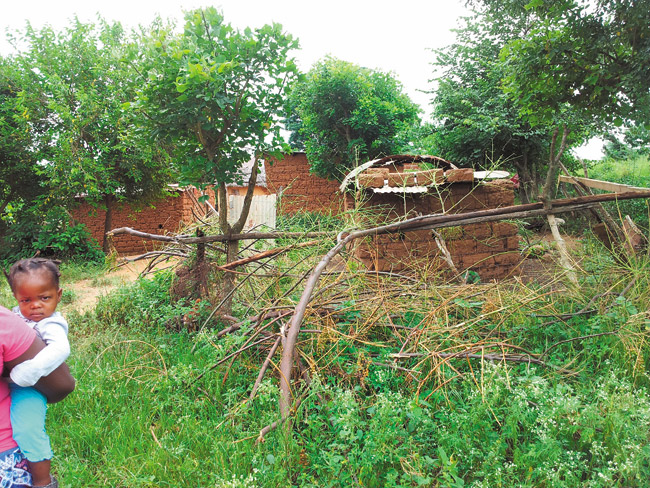Stepping In To Save Swaziland Babies

This baby Oprah look-alike was allowed by her grandfather to live at Project Canaan. Photos from Susan Page
Late January is summer in the Kingdom of Swaziland – and seriously hot. It’s also when poisonous black mamba snakes are out and about. Deadly, slithering creatures normally would deter me, but this trip halfway around the world was to meet 49 babies at a place called Project Canaan. On this 2,500-acre nonprofit farm, these babies – most abandoned at birth – are thriving under the watchful supervision of Janine Maxwell, co-founder of Heart for Africa and driving force behind its mission to save, nurture, educate, feed and house the otherwise discarded. She and husband Ian, Heart for Africa’s CEO, live on Project Canaan.
Just after our arrival, Janine asked, “Wanta join me tomorrow?”
After many “uncommon” outings with her in Africa over eight years, I always say yes, realizing that despite trepidation, I’ll be better for the experience (black mambas notwithstanding).
This particular morning, Janine was her usual multi-tasking self, negotiating the impossible roads of Swaziland in HFA’s worn four-wheel drive Land Rover. First, we delivered a pregnant 17-year-old Swazi girl to her final medical appointment before the due date in two weeks. After much anguish, the girl had decided not to abort her baby, a product of rape by a policeman, and instead place it at Project Canaan’s El Roi baby house. (Read the shocking details of a Swazi maternity hospital at www.janinemaxwell.blogspot.com.)
I was merely a tag-along, sworn to observe, not be my normal chatterbox. Also along was an El Roi caregiver and a little toddler who was, I swear, the spitting image of a baby Oprah Winfrey. Only two weeks prior, a Swazi social welfare worker had asked Janine if “Oprah” could live at El Roi, and she was already getting on famously there, a little talk show star in the making. However, her aged grandfather, as legal guardian, demanded a meeting to discuss his grandchild.
“Oprah’s social welfare worker joined us, and off we headed into the remote countryside of mud huts and rugged roads in search of her grandfather’s homestead. As we drove, it was sinking in that Oprah might not come home with us. Little girls don’t fare well in Swazi culture, which affords them no right to refuse family males – regarding sex or otherwise. Girls are powerless and often abused. Under Swazi law, the grandfather has rights to Oprah, whose teenage mother died in childbirth. A younger sister, 15, couldn’t continue caring for the baby.
On the road, we blessedly encountered the village runner, the chief’s liaison, who knew the family. He led us down a narrow, rocky foot path to a rundown cluster of two mud huts overgrown with brambles, where mongrel dogs and some skinny chickens roamed. (Black mambas crossed my mind.) Eventually, grandpa emerged and we all sat in a circle. Oprah toddled over and crawled into his lap.
Serious dialogue ensued in SiSwati. The runner weighed in, too. As Oprah stared intently at each talker, I pictured the real Oprah. Grandpa tearfully said he loved the child, who reminded him of his dead daughter. It was sad, but not enough to imagine Oprah left there for him to raise.
Suddenly, Grandpa announced he had to consult with his brother, who lived nearby. Trudging a sweltering quarter mile, we found ourselves in another circle with the brother and his wives. After everyone said their piece, Janine spoke eloquently. She was very respectful yet blunt. At Project Canaan, the baby would be nourished mentally, physically and spiritually. She would go to school for free and be loved. Oprah potentially could become one of Swaziland’s future leaders. The decision was theirs.
It turns out two other children from this family are placed in another Swazi care home. How many more would there be?
Relief overwhelmed us as we escorted cheery baby Oprah home. Then, around 1 p.m., Janine answered her ringing cell phone. The pregnant teen we’d dropped off for her appointment had gone into early labor. “Do you want me there?” Janine asked. “OK, I’ll get there as soon as I can.”
And off we went.
I lent support as Janine coached the scared teen through her first labor, then delivery. It was awkward and draining, but as we drove over the mountain that night in darkness, in my arms was a 45-minute-old healthy baby boy, Project Canaan’s baby No. 50, now called Jerry, after my husband Jerry Coffee. (Janine emails that 51 and 52 have since arrived.)
And why, you may ask, didn’t we adopt one of the babies?
Because it’s not legal to adopt Swaziland babies, in part because of concerns about potential abuses by human traffickers.
For more on Project Canaan, go to heartforafrica.org.
susanpagecoffee@gmail.com






